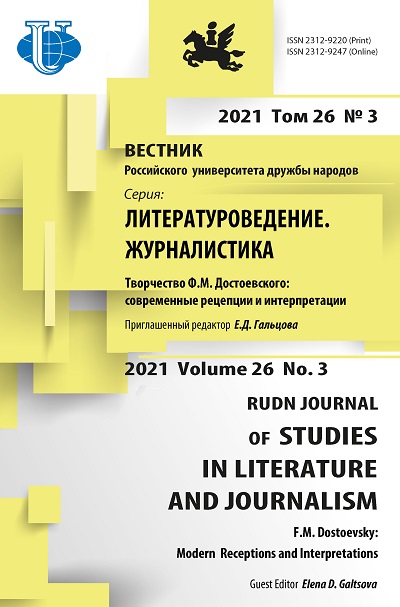Проблема свободы и своеволия: интерпретация образа Аркадия Свидригайлова
- Авторы: Горбачевский Ч.А.1
-
Учреждения:
- Южно-Уральский государственный университет
- Выпуск: Том 26, № 3 (2021): ТВОРЧЕСТВО Ф.М. ДОСТОЕВСКОГО: СОВРЕМЕННЫЕ РЕЦЕПЦИИ И ИНТЕРПРЕТАЦИИ
- Страницы: 451-456
- Раздел: Литературоведение
- URL: https://journals.rudn.ru/literary-criticism/article/view/27646
- DOI: https://doi.org/10.22363/2312-9220-2021-26-3-451-456
- ID: 27646
Цитировать
Полный текст
Аннотация
В статье рассматривается проблема соотношения свободы и своеволия на примере одного из героев романа Достоевского «Преступление и наказание». Внимание акцентируется не только на каноническом тексте романа, но и на подготовительных материалах к нему. Ставится задача выявить связь названной проблемы с проблемой самоубийства Аркадия Свидригайлова. Выдвигается тезис о том, что для героев Достоевского своеволие часто становится рабством у собственной природы и собственных страстей. С помощью разврата Свидригайлов пытается самоутвердиться, отдавая свою душу «на откуп» своеволию. Есть определённая закономерность в том, что такую мировоззренческую логическую цепочку завершает трагический акт самоубийства. Аркадий Иванович обожает комфорт, и поэтому в соответствии с его же логикой не случившееся его убийство Дуней, может рассматриваться в том числе и как попытка комфортного способа самоубийства. В подготовительных материалах к роману Свидригайлов протестует против трусливой подлости и ставит самоубийство выше подобного унизительного состояния, хотя и понимает всю ущербность своего положения. При всех сложностях проблемы свободы и своеволия - одной из лейтмотивных религиозно-философских проблем творчества писателя - Достоевский не видит ее формального, внешнего разрешения.
Ключевые слова
Об авторах
Чеслав Антонович Горбачевский
Южно-Уральский государственный университет
Автор, ответственный за переписку.
Email: cheslavgor@gmail.com
ORCID iD: 0000-0002-9145-7721
кандидат филологических наук, доцент кафедры русского языка и литературы
Российская Федерация, 454080, Челябинск, просп. Ленина, д. 76Список литературы
- Ницше Ф. Так говорил Заратустра // Ницше Фридрих. Сочинения: в 2 т. М.: Мысль, 1990. Т. 2. С. 5-237.
- Бердяев Н.А. О русских классиках. М.: Высшая школа, 1993. 368 с.
- Мандельштам Н.Я. Вторая книга. М.: Олимп Астрель, 2001. 509 с.
- Достоевский Ф.М. Полное собрание сочинений: в 30 т. Л.: Наука, 1972-1990.
- Мережковский Д.С. Л. Толстой и Достоевский. Вечные спутники. М.: Республика, 1995. 624 с.
- Гессе Г. Письма по кругу. М.: Прогресс, 1987. 396 с.
Дополнительные файлы















